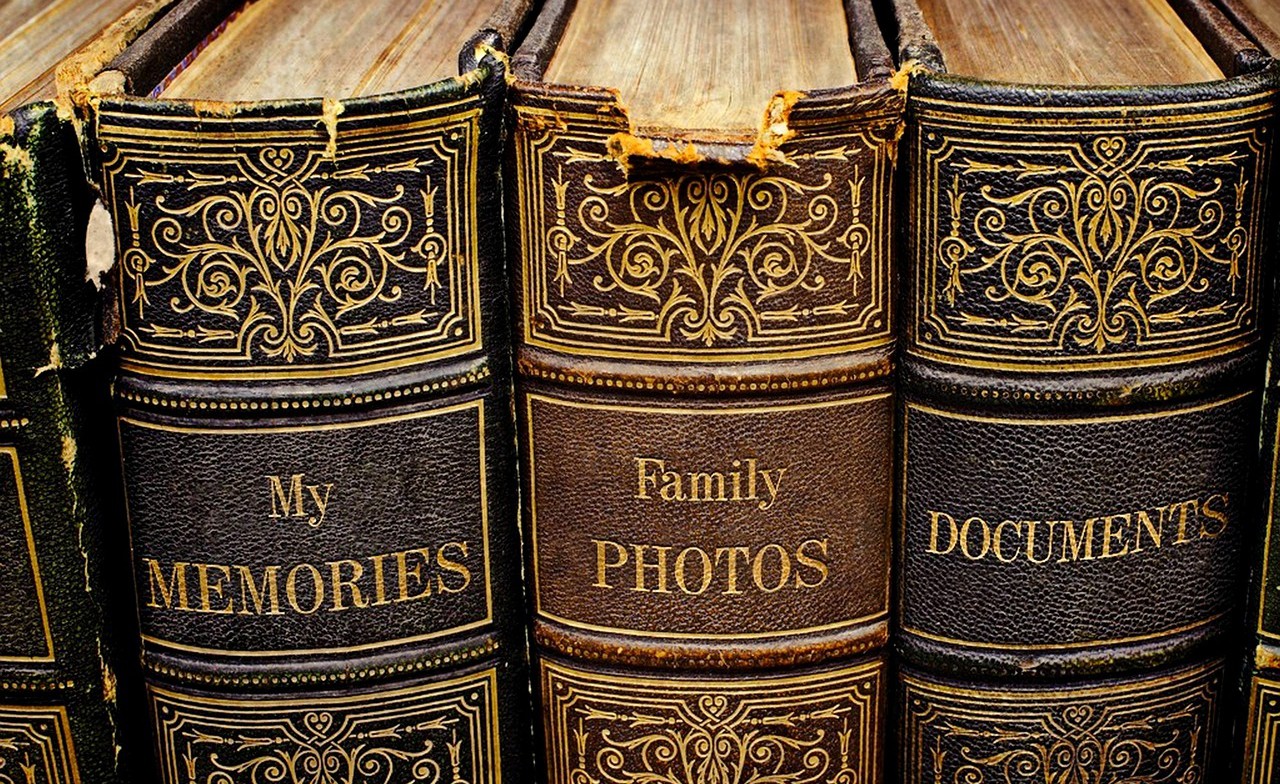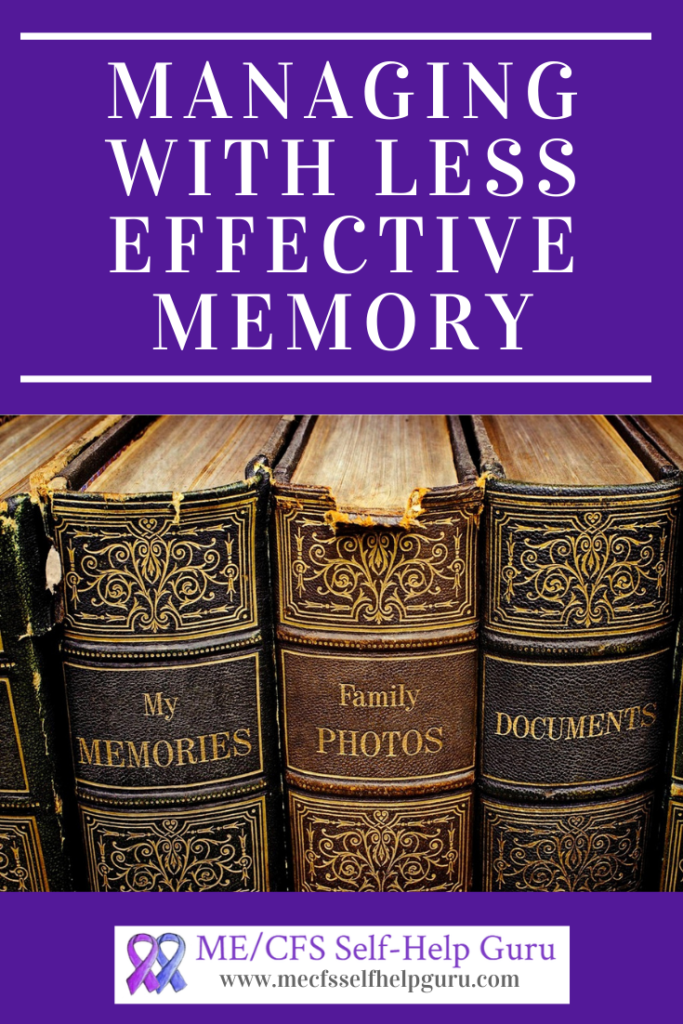This is a post I wrote especially for ProHealth’s Inspirational Corner and first appeared there in Feb 2016
I see myself as a person who has always had a bad memory for people and events, I can rarely remember specifics of anything just vague overall impressions. I recently read about some studies¹ about overgeneralised memory which made a lot of sense to my experience. Under certain conditions, retrieval of memory stops at a general level and doesn’t progress to the specifics of an event, one of those circumstances is exhaustion. It seems that when we are tired we are less likely to expend our energy on finding the specifics of our memories. With over 13 years of ME/CFS under my belt no wonder I see myself as having a bad memory!
Unfortunately more research discovered that people who tend to retrieve their memories in this less specific way tend to have more difficulty letting go of the past and getting over things that go wrong². Negative memories, which are only remembered generally and without detail, tend to contribute to a more general negative outlook. So as people with chronic illness such as ME/CFS, Fibromyalgia and Lyme disease, not only do we have less energy to recall the specifics of our memories, but accessing them in this general way can leave us with inadequate resources for letting go and moving on when things go wrong. Instead we accumulate evidence that the world is to be seen in negative terms. That’s a double whammy of disability to overcome!
So how can we get over the impact that lack of energy has on our memories?
 Memory Aids
Memory Aids
Photos and videos can be a great way to keep memories alive. Photography can be a pretty low energy hobby too as long as you don’t get into expensive heavy cameras with an entourage of different lenses and filters to cart around all the time. Remember though, that taking photos to help with your memories isn’t always about the best composition or creating a piece of art. Remind yourself what it is about a particular scene or event that you want to capture for your memory. It may be that during a joyous moment of a family gathering people aren’t lined up in a way that creates a perfect picture, but the picture could still capture the smiles and laughter that will remind you of that joy when you see it.
Videos can be useful even if you can’t attend events that are important to your nearest and dearest. Make a date to be the first to watch the video with them, let the premiere viewing be an event in itself, something that your loved one can share with you! That way you’ll have a positive memory of sharing something important rather than a negative memory of not being well enough to attend the event in person! And every time you watch the video later you can choose to remember those moments of sharing!
Journaling is another way of recording your memories. One way to tackle negatively biased perception that can result from overgeneralised memory is to make a point of recording the happy details. Each day record 3 happy moments, or things to be grateful for, no matter what else you need to journal about. Then when you look back on times that weren’t great you’ll be able to see that they weren’t all bad either.
Another strategy is the achievements jar. Each week you could write a list of all your achievements, and place the list in a jar to be accessed at the end of the year, or any time when you’re looking back with only an overgeneralised sense that things didn’t go well. If you find it difficult to remember achievements at the end of the week, have another jar to write them daily and at the end of each week take them out and write the best of them on your weekly list!
Mindfulness
In another study³ the researchers above found that practicing mindfulness helps make memories more specific and less general. Mindfulness is all about becoming more aware of the present moment, cultivating acceptance and becoming more skilful at taking control over spiralling thought patterns. It makes sense that the resulting peace leaves our minds with more energy to remember the specifics!
Mindfulness can also help us avoid turning any overgeneralised memories into a general negative outlook. With awareness, we can chose not to give those memories too much power, by remembering that they are vague, and involve an emotional bias. Without the specifics of the memory we can’t re-evaluate and learn from it, instead it’s just better to put it behind us and let it go!
- Mindfulness: A practical guide to finding peace in a frantic world Mark Williams and Danny Penman (2011) Piatkus (chapter 10)
- ‘Autobiographical memory specificity and emotional disorder’ Williams J. M.; Barnhofer T; Crane C; Herman D; Raes F; Watkins E, Dalgleish T; Psychological Bulletin, Vol 133(1), Jan 2007, 122-148. link to abstract: http://psycnet.apa.org/index.cfm?fa=search.displayRecord&uid=2006-23058-006#
- ‘Mindfulness-based cognitive therapy reduces overgeneral autobiographical memory in formerly depressed patients.’ Williams J.M., Teasdale J.D., Segal Z.V., Soulsby J. J; Abnorm Psychol. 2000 Feb;109(1):150-5. Link to abstract: http://www.ncbi.nlm.nih.gov/pubmed/10740947
Updated 31/10/21








I love the idea of an achievements jar. I’m terrible at remembering the good things and tend to only remember the bad. I need that reminder that awesome things have actually happened!
I can relate to a lot of that, thankyou, I enjoyed reading something which helped other things make sense 🙂
You’re so right about exhaustion and memory, I can barely remember January, or, February and we’re into mid-March already. I’d like to add stress into the mix as it also contributes to the Mental exhaustion, I am currently coming out of a difficult time and my CFS & anxiety have both played key roles in it.
Everything goes to pot!
My sleep, eating & tablet taking routines go out of the window, I’ve tried all sorts to get my meds into me in a strict regime…. just cannot seem manage to do it, always missing doses, and I’ve been fighting this for over 10yrs too. I always believed that as time went by it would just happen and the routines would stay in place but that only lasted for a few years. After a stint of 2 1/2 weeks in hospital a couple of years ago I’ve never managed to get things back to, ‘my’, normal.
My long term memory is fine though, it’s just my short-term, but I’ve often just blamed the medications for it. I now think it’s a combination of all factors.
I like the idea of the achievements jar and think it will be liked by my support group members too, so I shall passing that idea onwards to them on Wednesday… providing I remember 😮 hehe
I remind my group members to reward themselves for their achievements even if it is just because they managed to get washed and dressed. I believe it encourages more positive thinking and it works for me, but naturally won’t be for everyone.
Thanks again & wishing you wellness 🙂